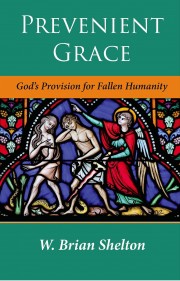Editor’s Note: In case you’re new with us, let me bring you up to date regarding this discussion. Dr. Tom Nettles of our Board of Reference here at Books At a Glance recently posted a review of Dr. Brian Shelton’s Prevenient Grace: God’s Provision for Fallen Humanity. In this book Dr. Shelton defends an Arminian perspective on the subject, and in the review Dr. Nettles offered a respectful critique from a Calvinist perspective. Dr. Nettles and I agreed that it would be good to allow Dr. Shelton – also a friend of Books At a Glance – an opportunity to respond. The exchange has been respectful and illuminating, and I appreciate the graciousness displayed by both of these men – we now can say that at least once in our lifetime we have seen a Calvinist-Arminian debate that didn’t embarrass either side! Many thanks to them both.
Now today, Dr. Nettles finishes up the conversation with some final reflections.
My Final Remarks
Brian Shelton has done an excellent job both of presenting his position on prevenient grace and of interacting with my review and doctrinal reservations. He has carried on the discussion with aptitude and frankness and has helped those on both sides of this issue identify more precisely our points of difference. My continued rejection of the position he defends comes, not from any inadequacy or lack of candor in his explanation, but from an even more deeply held conviction that it is not right. I will close my portion of this discussion by making short extrapolations on two issues.
Does Responsibility Entail Ability?
First, his candid admission that he accepts Wesley’s view of God’s obligation to give grace has helped me see that this theological presupposition must be behind the Arminian insistence on universally operative prevenient grace. Stated in his own words, Dr. Shelton asserts, “it is an issue of the justice of God that the sons of Adam are expected to repent if they cannot repent; accountability without opportunity should be posited as unjust.” He does want the reader to acknowledge, however, that the Arminian argues more from the clarity of Scripture than from any extrapolation of a theory of justice. But the two cannot be so easily parted. This idea of the injustice involved in the Reformed view of total depravity serves as a hermeneutical assumption for large numbers of Scriptures. If you are committed to the principle that God’s commands or the stated conditions of salvation are just only if God has already granted enabling grace as a remedy to inherited depravity, then every command ipso facto becomes an argument for prevenient grace. Shelton shows the thoroughness with which this assumption penetrates the Arminian system when he argues, “If there is human responsibility yet there remains perpetual inability for responsibility in repentance, then the free will passages (as simple as John 3:16) are moot.” How is John 3:16 a “free-will passage?” It states a certainty built on a state of existence: “so all those believing into him would not perish but would be having eternal life.” The statement of such a condition, “all those believing into him,” is just as true for those that espouse effectual grace as for those who contend for a non-effectual prevenient grace. That this implies the Arminian idea of free will is not demanded by the text at all, but only by the inference drawn from the no-grace-no-justice assumption.
Again, Dr. Shelton responds, “it [the concept of “dead in trespasses and sins”] must be reconciled with the human responsibility passages in Scripture in which all of humankind is expected to repent. They must be harmonized in systematic theology, without depravity eclipsing human responsibility.” Certainly; the Reformed view never denies human responsibility, but affirms it as an absolute existing in all persons as moral agents irrespective of how God may move on them with unmerited favor. Sinners are responsible for their sin apart from the divine prerogative to bestow or not bestow grace. Brian, however, infers from the expectation to repent a gracious bestowal of moral ability. In another part of his response he notes, “Add the call for repentance and obedience throughout Scripture to this passage [Hebrews 10:12] set to land on a paradoxical combination of grace and ability that is the basis of prevenient grace” (italics mine).This piggy-backing of grace onto the command does not come from any element in the text, but only from the assumption that a command is illegitimate and unjust unless it is given in the context of a restored moral ability. With this hermeneutical principle, the textual “basis of prevenient grace” seems vast. Reject the principle that command always implies sufficient grace, and the textual basis for universal prevenient grace becomes sparse.
The few remaining texts (Dr. Shelton mentions specifically John 1:9, Romans 2:4, John 12:32, and Titus 2:11) more fittingly express an element of the Reformed soteriological view, but this is not the place to argue that. Moreover, the whole idea of obligatory grace is so contrary to the biblical presentation of grace as pure gift that it is beyond surprising that it could be seriously considered. If our fall in Adam and our consequent depravity (admitted by Arminians) renders God a debtor to humanity and an unjust sovereign if he has does not reverse the inherited condition, then the covenantal arrangement was both unwise and unjust from the beginning. Such an idea of God’s initiating an arrangement that is unjust is absurd and establishes a systemic irreverence in the entire Arminian scheme. Its primary concern seems to be the vindication of the human complaint “God is unrighteous to inflict wrath on us,” rather than the justification of God. (Romans 3:3-8).
How Do Fallen Sinners Come to Believe?
A second issue that has not been cleared is the question of how the human soul chooses the principles of holiness and righteousness intrinsic to the gospel presentation without a bias of mind and heart approving those gospel elements. Dr. Shelton notes on one of his major biblical defenses of prevenient grace related to John 1:9, “The context is not an excuse for predestination to salvation in order to see the Light, but a paradoxical irony that the ‘light shown [sic] in darkness’ but those unwilling would not see.” Precisely! This passage concerns an enlightenment that would give to an unbiased heart abundant reason to worship and adore the great wonder of the knowledge of God but, in coming to fallen persons, still leaves them unwilling, that is, with a moral propensity in opposition to the true and pure worship of God. The question here is not one of either predestination or election to salvation (that must be discussed separately as should the doctrine of atonement) but of the character of the present grace that brings the sinful moral agent from the state of unwillingness to willingness. Elements of persuasion falling on hearts still biased toward evil only produce hearts more hardened still.
If freedom is defined as moral neutrality or equilibrium, then there can be nothing in a gospel presentation that moves a soul either one way or another, and any coincidental response must be prompted by something other than the moral texture of the gospel. On the other hand, if grace moves the soul into a disposition in which holiness and righteousness are seen as excellent and desirable (Philippians 3:7-9), the gospel presentation will be met with the response of faith. An enabling that stops short of creating a heart that is congruent with gospel conditions is no enabling at all.
Tom J. Nettles

